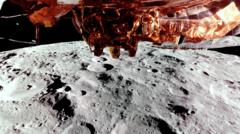Humanity is on the brink of a pivotal moment as scientists uncover evidence suggesting the existence of life on distant planets like K2-18b. With advanced tools like the James Webb Space Telescope, experts believe the quest for alien life might soon transform our understanding of existence and our role in the universe.
The Search for Alien Life: A Paradigm Shift for Humanity

The Search for Alien Life: A Paradigm Shift for Humanity
Recent discoveries hint at extraterrestrial life, challenging humanity's understanding of its place in the cosmos.
In a groundbreaking development, scientists are inching closer to answering one of humanity’s oldest questions: are we alone in the universe? The announcement of potential biosignatures—gases indicative of life—on the planet K2-18b has ignited excitement and speculation within the scientific community. Prof. Nikku Madhusudhan, leading this research, notes, "This is basically as big as it gets in terms of fundamental questions." Such discoveries prompt reflection on the profound implications for human identity and existence.
For centuries, human beings have woven tales of extraterrestrial life, from Martian civilizations imagined in early astronomy to the themed alien encounters of modern pop culture. However, recent evidence has emerged not from Mars or Venus, but from distant exoplanets. Research indicates our galaxy may host billions of planets potentially suitable for life, particularly within what astronomers call the "Goldilocks Zone."
Innovative instruments and powerful telescopes, including NASA’s James Webb Space Telescope, enable scientists to analyze the atmospheres of these distant worlds. The breakthrough technologies allow the detection of minute chemical signatures that could signify biological processes. Looking ahead, NASA is set to launch the Habitable Worlds Observatory in the 2030s, furthering the search for life in our galaxy.
Despite these developments, the prospect of confirming extraterrestrial life raises complex questions. Prof. Madhusudhan anticipates that within two years, evidence may solidify, yet initial confirmations may lead to further debates on whether detected biosignatures might arise from non-biological processes. As research develops, consensus may gradually emerge, especially as evidence accumulates across various planetary atmospheres.
Meanwhile, interest in our own solar system remains robust. Missions scheduled in the coming years, such as the European Space Agency’s ExoMars rover and China’s Tianwen-3 mission, aim to unearth signs of life on Mars and its icy moons. These expeditions could uncover critical insights into life’s potential origin and implications for future explorations.
The question of intelligent life remains contentious. While simple life forms may exist across the cosmos, the emergence of complex and intelligent beings is less certain. Understanding the unique conditions leading to life on Earth remains a scientific mystery that researchers are eager to unravel.
For many scientists, the discovery of extraterrestrial life signifies a greater understanding of humanity’s role in the universe. As Dr. Robert Massey notes, such discoveries might further diminish the perception of human exceptionalism within the vastness of space. In contrast, Prof. Michele Dougherty emphasizes that uncovering life beyond Earth offers valuable perspectives on our evolutionary journey and might foster a sense of connection to a broader cosmic community.
As humanity navigates this exciting frontier, researchers agree that the possibility of discovering alien life evokes optimism rather than fear. Prof. Madhusudhan anticipates a transformation in human consciousness, leading to greater unity and understanding across global divides. Ultimately, the search for extraterrestrial life is not merely scientific; it is a journey toward reshaping our identity and place in the cosmos.
The ongoing pursuit of knowledge in this domain promises riveting developments and transformative revelations that could redefine our understanding of existence itself.
For centuries, human beings have woven tales of extraterrestrial life, from Martian civilizations imagined in early astronomy to the themed alien encounters of modern pop culture. However, recent evidence has emerged not from Mars or Venus, but from distant exoplanets. Research indicates our galaxy may host billions of planets potentially suitable for life, particularly within what astronomers call the "Goldilocks Zone."
Innovative instruments and powerful telescopes, including NASA’s James Webb Space Telescope, enable scientists to analyze the atmospheres of these distant worlds. The breakthrough technologies allow the detection of minute chemical signatures that could signify biological processes. Looking ahead, NASA is set to launch the Habitable Worlds Observatory in the 2030s, furthering the search for life in our galaxy.
Despite these developments, the prospect of confirming extraterrestrial life raises complex questions. Prof. Madhusudhan anticipates that within two years, evidence may solidify, yet initial confirmations may lead to further debates on whether detected biosignatures might arise from non-biological processes. As research develops, consensus may gradually emerge, especially as evidence accumulates across various planetary atmospheres.
Meanwhile, interest in our own solar system remains robust. Missions scheduled in the coming years, such as the European Space Agency’s ExoMars rover and China’s Tianwen-3 mission, aim to unearth signs of life on Mars and its icy moons. These expeditions could uncover critical insights into life’s potential origin and implications for future explorations.
The question of intelligent life remains contentious. While simple life forms may exist across the cosmos, the emergence of complex and intelligent beings is less certain. Understanding the unique conditions leading to life on Earth remains a scientific mystery that researchers are eager to unravel.
For many scientists, the discovery of extraterrestrial life signifies a greater understanding of humanity’s role in the universe. As Dr. Robert Massey notes, such discoveries might further diminish the perception of human exceptionalism within the vastness of space. In contrast, Prof. Michele Dougherty emphasizes that uncovering life beyond Earth offers valuable perspectives on our evolutionary journey and might foster a sense of connection to a broader cosmic community.
As humanity navigates this exciting frontier, researchers agree that the possibility of discovering alien life evokes optimism rather than fear. Prof. Madhusudhan anticipates a transformation in human consciousness, leading to greater unity and understanding across global divides. Ultimately, the search for extraterrestrial life is not merely scientific; it is a journey toward reshaping our identity and place in the cosmos.
The ongoing pursuit of knowledge in this domain promises riveting developments and transformative revelations that could redefine our understanding of existence itself.


















